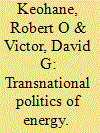|
|
|
Sort Order |
|
|
|
Items / Page
|
|
|
|
|
|
|
| Srl | Item |
| 1 |
ID:
090079


|
|
|
|
|
| Publication |
2009.
|
| Summary/Abstract |
Electricity sector is among the key users of natural gas. The sustained electricity deficit and environment policies have added to an already rising demand for gas. This paper tries to understand gas demand in future from electricity sector. This paper models the future demand for gas in India from the electricity sector under alternative scenarios for the period 2005-2025, using bottom-up ANSWER MARKAL model. The scenarios are differentiated by alternate economic growth projections and policies related to coal reforms, infrastructure choices and local environment. The results across scenarios show that gas competes with coal as a base-load option if price difference is below US $ 4 per MBtu. At higher price difference gas penetrates only the peak power market. Gas demand is lower in the high economic growth scenario, since electricity sector is more flexible in substitution of primary energy. Gas demand reduces also in cases when coal supply curve shifts rightwards such as under coal reforms and coal-by-wire scenarios. Local environmental (SO2 emissions) control promotes end of pipe solutions flue gas de-sulfurisation (FGD) initially, though in the longer term mitigation happens by fuel substitution (coal by gas) and introduction of clean coal technologies integrated gasification combined cycle (IGCC).
|
|
|
|
|
|
|
|
|
|
|
|
|
|
|
|
| 2 |
ID:
097249


|
|
|
|
|
| Publication |
2010.
|
| Summary/Abstract |
At present carbon capture and storage (CCS) is very expensive and its performance is highly uncertain at the scale of commercial power plants. Such challenges to deployment, though, are not new to students of technological change. Several successful technologies, including energy technologies, have faced similar challenges as CCS faces now. To draw lessons for the CCS industry from the history of other energy technologies that, as with CCS today, were risky and expensive early in their commercial development, we have analyzed the development of the US nuclear-power industry, the US SO2-scrubber industry, and the global liquefied natural gas (LNG) industry. Through analyzing the development of the analogous industries we arrive at three principal observations. First, government played a decisive role in the development of all of these analogous technologies. Second, diffusion of these technologies beyond the early demonstration and niche projects hinged on the credibility of incentives for industry to invest in commercial-scale projects. Third, the conventional wisdom that experience with technologies inevitably reduces costs does not necessarily hold. Risky and capital-intensive technologies may be particularly vulnerable to diffusion without accompanying reductions in cost.
|
|
|
|
|
|
|
|
|
|
|
|
|
|
|
|
| 3 |
ID:
112345


|
|
|
|
|
| Publication |
2012.
|
| Summary/Abstract |
For too long, climate diplomacy has focused on carbon dioxide. But at least 40 percent of global warming can be blamed on shorter-lived pollutants, which also cause disease and damage crops in developing states. Reining in pollution would thus accomplish two goals, while finally getting countries such as China and India into the climate-change business.
|
|
|
|
|
|
|
|
|
|
|
|
|
|
|
|
| 4 |
ID:
110756


|
|
|
|
|
| Publication |
2011.
|
| Summary/Abstract |
China has emerged as a leader in coal liquefaction. While the country's abundant coal resources and acute concerns about oil security help explain China's interest in liquefaction, the driving forces for this industry are complicated and policy has been inconsistent. Since 2006 Beijing has tried to slow down the development of liquefaction; even as China has become more dependent on imported oil, the central government has been wary about the large impact of liquefaction technologies on scarce resources such as water. However, local government officials in coal rich areas have strong incentives to pour investment into the technology, which helps explain the uneven development and policy. The future of coal liquefaction will depend on how these forces unfold along with major Beijing-led reforms in the Chinese coal industry, which is closing smaller mines and favoring the emergence of larger coal producing firms. Those reforms will have mixed effects on liquefaction. They temporarily contribute to higher prices for coal while over the longer term creating coal companies that have much greater financial and technical skills needed to deploy technologies such as coal liquefaction at a scale needed if this energy pathway is to be competitive with conventional sources of liquid fuel.
|
|
|
|
|
|
|
|
|
|
|
|
|
|
|
|
| 5 |
ID:
121595


|
|
|
|
|
| Publication |
2013.
|
| Summary/Abstract |
Experimental evidence in cognitive psychology and behavioral economics is transforming the way political science scholars think about how humans make decisions in areas of high complexity, uncertainty, and risk. Nearly all those studies utilize convenience samples of university students, but in the real world political elites actually make most pivotal political decisions such as threatening war or changing the course of economic policy. Highly experienced elites are more likely to exhibit the attributes of rational decision-making; and over the last fifteen years a wealth of studies suggest that such elites are likely to be more skilled in strategic bargaining than samples with less germane experience. However, elites are also more likely to suffer overconfidence, which degrades decision-making skills. We illustrate implications for political science with a case study of crisis bargaining between the US and North Korea. Variations in the experience of US elite decision-makers between 2002 and 2006 plausibly explain the large shift in US crisis signaling better than other rival hypotheses such as "Iraq fatigue." Beyond crisis bargaining other major political science theories might benefit from attention to the attributes of individual decision-makers.
|
|
|
|
|
|
|
|
|
|
|
|
|
|
|
|
| 6 |
ID:
134979


|
|
|
|
|
| Summary/Abstract |
Why do some decision makers prefer big multilateral agreements while others prefer cooperation in small clubs? Does enforcement encourage or deter institutional cooperation? We use experiments drawn from behavioral economics and cognitive psychology—along with a substantive survey focused on international trade—to illustrate how two behavioral traits (patience and strategic reasoning) of individuals who play key roles in negotiating and ratifying an international treaty shape their preferences for how treaties are designed and whether they are ratified. Patient subjects were more likely to prefer treaties with larger numbers of countries (and larger long-term benefits), as were subjects with the skill to anticipate how others will respond over multiple iterations of strategic games. The presence of an enforcement mechanism increased subjects' willingness to ratify treaties; however, strategic reasoning had double the effect of adding enforcement to a trade agreement: more strategic subjects were particularly likely to favor ratifying the agreement. We report these results for a sample of 509 university students and also show how similar patterns are revealed in a unique sample of ninety-two actual US policy elites. Under some conditions certain types of university student convenience samples can be useful for revealing elite-dominated policy preferences—different types of people in the same situation may prefer to approach decision-making tasks and reason through trade-offs in materially different ways
|
|
|
|
|
|
|
|
|
|
|
|
|
|
|
|
| 7 |
ID:
021357


|
|
|
|
|
| Publication |
May-June 2002.
|
| Description |
107-121
|
|
|
|
|
|
|
|
|
|
|
|
|
|
|
|
| 8 |
ID:
001217


|
|
|
|
|
| Publication |
Cambridge, MIT Press, 1998.
|
| Description |
xxv, 737p.
|
| Standard Number |
0261220571
|
|
|
|
|
|
|
|
|
|
|
|
Copies: C:1/I:0,R:0,Q:0
Circulation
| Accession# | Call# | Current Location | Status | Policy | Location |
| 040751 | 363.70526/VIC 040751 | Main | On Shelf | General | |
|
|
|
|
| 9 |
ID:
081585


|
|
|
|
|
| Publication |
2008.
|
| Summary/Abstract |
Oil stocks can help buffer economic shocks, but only if Washington radically reforms its handling of them
|
|
|
|
|
|
|
|
|
|
|
|
|
|
|
|
| 10 |
ID:
073884


|
|
|
|
|
| Publication |
Cambridge, Cambridge University Press, 2006.
|
| Description |
xix, 508p.
|
| Standard Number |
0521865034
|
|
|
|
|
|
|
|
|
|
|
|
Copies: C:1/I:0,R:0,Q:0
Circulation
| Accession# | Call# | Current Location | Status | Policy | Location |
| 051662 | 382.42285/VIC 051662 | Main | On Shelf | General | |
|
|
|
|
| 11 |
ID:
094470


|
|
|
|
|
| Publication |
2010.
|
| Summary/Abstract |
The last decade has seen an extraordinary shift in expectations for the world energy system. After a long era of excess capacity, since 2001, prices for oil and most energy commodities have risen sharply and become more volatile. Easy-to-tap local fuel supplies have run short, forcing major energy consumers to depend on longer and seemingly more fragile supply chains. Prices have yo-yoed over the last 18 months: first reaching all-time highs, then dropping by two-thirds, and after that rising back up to surprisingly high levels given the continuing weakness of the global economy. The troubles extend far beyond oil. Governments in regions such as Europe worry about insecure supplies of natural gas. India, among others, is poised to depend heavily on coal imports in the coming decades.
|
|
|
|
|
|
|
|
|
|
|
|
|
|
|
|
| 12 |
ID:
153372


|
|
|
| 13 |
ID:
144034


|
|
|
|
|
| Summary/Abstract |
After dithering for decades, governments finally seem to be paying serious attention to the problem of global climate change. Late last year, at the Paris climate conference, they adopted a major new agreement [1] to limit global warming, beginning a process to strengthen commitments to reduce greenhouse gas emissions over time. For many observers, the promises of the Paris conference offer too little, too late, because emissions are high and still rising and because there will be major disruptions to the climate [2] even if countries meet their emissions-reduction pledges. Nevertheless, it had been 18 years since the world’s governments left a major climate summit with an agreement in hand, so just getting to yes in Paris has offered climate diplomacy [3] fresh credibility.
|
|
|
|
|
|
|
|
|
|
|
|
|
|
|
|
| 14 |
ID:
146055


|
|
|
|
|
| Summary/Abstract |
There is heated debate over the wisdom and effect of secrecy in international negotiations. This debate has become central to the process of foreign investment arbitration because parties to disputes nearly always can choose to hide arbitral outcomes from public view. Working with a new database of disputes at the world's largest investor-state arbitral institution, the World Bank's International Centre for Settlement of Investment Disputes, the authors examine the incentives of firms and governments to keep the details of their disputes secret. The authors argue that secrecy in the context of investment arbitration works like a flexibility-enhancing device, similar to the way escape clauses function in the context of international trade. To attract and preserve investment, governments make contractual and treaty-based promises to submit to binding arbitration in the event of a dispute. They may prefer secrecy in cases when they are under strong political pressure to adopt policies that violate international legal norms designed to protect investor interests. Investors favor secrecy when managing politically sensitive disputes over assets they will continue to own and manage in host countries long after the particular dispute has passed. Although governments prefer secrecy to help facilitate politically difficult bargaining, secrecy diminishes one of the central purposes of arbitration: to allow governments to signal publicly their general commitment to investor-friendly policies. Understanding the incentives for keeping the details of dispute resolution secret may help future scholars explain more accurately the observed patterns of wins and losses from investor-state arbitration as well as patterns of investment.
|
|
|
|
|
|
|
|
|
|
|
|
|
|
|
|
| 15 |
ID:
068040


|
|
|
| 16 |
ID:
105363


|
|
|
|
|
| Publication |
2011.
|
| Summary/Abstract |
There is no integrated regime governing efforts to limit the extent of climate change. Instead, there is a regime complex: a loosely-coupled set of specific regimes. We describe the regime complex for climate change and seek to explain it, using interest-based, functional, and organizational arguments. This institutional form is likely to persist; efforts to build a comprehensive regime are unlikely to succeed, but experiments abound with narrower institutions focused on particular aspects of the climate change problem. Building on this analysis, we argue that a climate change regime complex, if it meets specified criteria, has advantages over any politically feasible comprehensive regime. Adaptability and flexibility are particularly important in a setting-such as climate change policy-in which the most demanding international commitments are interdependent yet governments vary widely in their interest and ability to implement them. Yet in view of the serious political constraints, both domestic and international, there is little reason for optimism that the climate regime complex that is emerging will lead to reductions in emissions rapid enough to meet widely discussed goals, such as stopping global warming at two degrees above pre-industrial levels.
|
|
|
|
|
|
|
|
|
|
|
|
|
|
|
|
| 17 |
ID:
053441


|
|
|
| 18 |
ID:
121036


|
|
|
|
|
| Publication |
2013.
|
| Summary/Abstract |
Creating effective energy policy is hard, in part because it often requires effective international coordination. For most salient energy-related issues - such as control of the emissions that cause global climate change or the building of stockpiles to make oil supplies more secure - international coordination is inherently difficult. Solutions lie in making these problems more manageable by working in small groups of relevant countries; successful cooperation also hinges on finding incentive-compatible commitments that align, to the extent feasible, with national interests and are focused on areas where cooperation will yield tangible joint gains. The outcomes of such cooperation efforts are likely to be decentralized complexes of networked institutions rather than integrated, hierarchical treaties that govern a coherently defined issue-area.
|
|
|
|
|
|
|
|
|
|
|
|
|
|
|
|
|
|
|
|
|